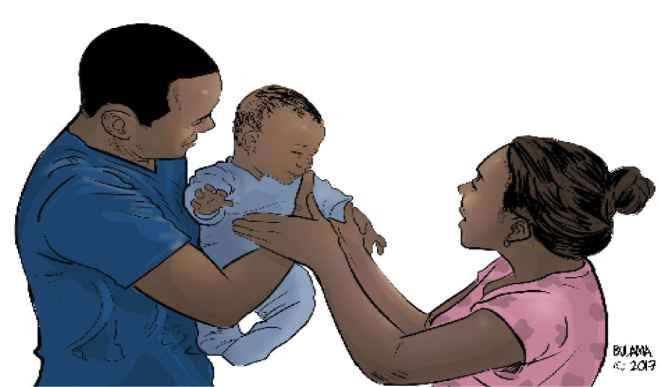
A name serves as an identity for one so it is most times seen as an honour to appoint someone to choose a name for a child. But there has been this raging argument over who is most qualified to choose a name for a child. Is it the father by virtue of his position as head of the home, the mother who carries the baby and eventually births him/her, grandparents, sibling, friends or circumstances surrounding the child’s birth?
Lifextra sought for answers and the responses were interesting.
Jide Glory Jones, an engineer with FERMA, simply said “Both parties can do that. What matters most as an African is whose name the child bears.”
Richard Emeka Uhegbu, a civil servant, says “naming a child refers to pronouncing the child’s name(s) at the appointed time (naming ceremony) by the father. The mother no doubt has every right to suggest a name for the child but the father has the God given mandate and tradition authority to name a child.
Chuks Enyi, an engineer, however belongs to the school thought that believes it is the man who should decide the name of a child. In his words, “The father should decide the name of the child. Apart from being the head of the family, it is his DNA the child has. That does not mean the mother and other relatives cannot name the child too, but it’s the father’s prerogative. In some cases, you’ll see both the father and mother’s input in the child’s name. For example: Adebayo Uchenna OSIBANJO.”
Mohammed Umar Babangida told Lifextra that what matters most is love. “My first child will be named by my wife because she is naturally more connected to the child than me. I’ll name the second and possibly let her name the third.”
Awodiya Funke, a poet, said “Any of them can give the child his or her name. But based on personal observation the name mothers love to call a child sticks more. The name the mother calls her child is what everybody calls the child.”
“Why does the mother’s name stick?” Lifextra wanted to know. She added “It sticks because in most cases the child spends more time the mum. People tend to ask her the name of the child more.”
Ahmed Mohammed told Lifextra “Circumstances/scenario is the best way to choose a name, so the situation in any of the families should decide the child’s name, as a reminder.
When Lifextra asked him to shed more light on what he meant by circumstances/scenarios, he said “In the case of the death of a patriarch or matriarch in the family, the child could be named after them; maybe times of peace and prosperity; even the death of a beloved brother, sister, aunt, cousin or family friend. Sometimes when people have been helped by a particular person, in appreciation for their help, they name their children after the person.”
He added, “There are a lot of circumstances that can influence the name of children – the circumstances of his birth, either the time of the year, or the way the mother or father suffered to bring the child into the world.”
Helen Ijeoma Pius, an Enugu-based mother of two, described the situation as really complicated. Attributing it to the African norms and tradition, she said “These days, men feel they have a 100 per cent right to name a child, neglecting the one person who went through hell both during pregnancy and childbirth to bring forth that child. By every right, parents should jointly decide on a child’s name.”
Concurring with Ijeoma, Sunday Michael, a journalist also describes it as complicated. Citing a personal experience, he said “I had it all planned out for my first child. I had Marlyn or Gerrald but my father wanted the boy named after him and everything else is history. He has a second and younger son who has chosen celibacy through the Catholic priesthood so it’s a compelling request you can’t turn down.
“I’m not sure of what the future holds but if anything happens, it will be my wife’s prerogative, come what may,” he concluded.

 Join Daily Trust WhatsApp Community For Quick Access To News and Happenings Around You.
Join Daily Trust WhatsApp Community For Quick Access To News and Happenings Around You.

